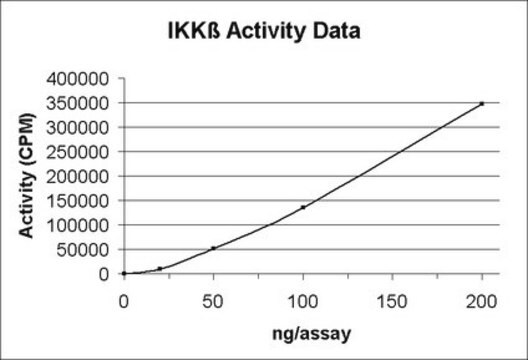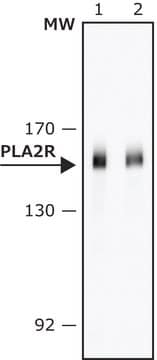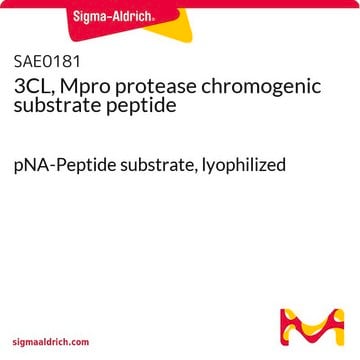Recommended Products
description
protein target IKKβ
Quality Level
assay
≥70%
specific activity
58 pmol/min-μg
concentration
0.1 mg/mL
technique(s)
activity assay: suitable
UniProt accession no.
Gene Information
human ... IKBKB(3551)
General description
FUNCTION: SwissProt: O14920 # Phosphorylates inhibitors of NF-kappa-B thus leading to the dissociation of the inhibitor/NF-kappa-B complex and ultimately the degradation of the inhibitor. Also phosphorylates NCOA3 (By similarity).
SIZE: 756 amino acids; 86564 Da
SUBUNIT: Preferentially found as a heterodimer with IKK-alpha but also as a homodimer. Directly interacts with IKK-gamma/NEMO and TRPC4AP. The tripartite complex can also bind to MEKK1, MAP3K14/NIK, IKAP and IKB-alpha-p65-p50 complex. Phosphorylated IKB-alpha is further released from the complex. Found in a complex composed of NCOA2, NCOA3, IKKA, IKBKG and CREBBP. Interacts with SQSTM1 through PRKCZ or PRKCI. Forms an NGF-induced complex with IKBKB, PRKCI and TRAF6. May interact with MAVS/IPS1. Interacts with NALP2. Interacts with Yersinia yopJ.
SUBCELLULAR LOCATION: Cytoplasm.
TISSUE SPECIFICITY: Highly expressed in heart, placenta, skeletal muscle, kidney, pancreas, spleen, thymus, prostate, testis and peripheral blood.
PTM: Upon cytokine stimulation, phosphorylated on Ser-177 and Ser- 181 by MEKK1 and/or MAP3K14/NIK; which enhances activity. Once activated, autophosphorylates on the C-terminal serine cluster; which decreases activity and prevents prolonged activation of the inflammatory response. & Yersinia yopJ may acetylate Ser/Thr residues, preventing phosphorylation and activation, which blocks the I-kappa-B signaling pathway.
SIMILARITY: SwissProt: O14920 ## Belongs to the protein kinase superfamily. Ser/Thr protein kinase family. IkappaB kinase subfamily. & Contains 1 protein kinase domain.
SIZE: 756 amino acids; 86564 Da
SUBUNIT: Preferentially found as a heterodimer with IKK-alpha but also as a homodimer. Directly interacts with IKK-gamma/NEMO and TRPC4AP. The tripartite complex can also bind to MEKK1, MAP3K14/NIK, IKAP and IKB-alpha-p65-p50 complex. Phosphorylated IKB-alpha is further released from the complex. Found in a complex composed of NCOA2, NCOA3, IKKA, IKBKG and CREBBP. Interacts with SQSTM1 through PRKCZ or PRKCI. Forms an NGF-induced complex with IKBKB, PRKCI and TRAF6. May interact with MAVS/IPS1. Interacts with NALP2. Interacts with Yersinia yopJ.
SUBCELLULAR LOCATION: Cytoplasm.
TISSUE SPECIFICITY: Highly expressed in heart, placenta, skeletal muscle, kidney, pancreas, spleen, thymus, prostate, testis and peripheral blood.
PTM: Upon cytokine stimulation, phosphorylated on Ser-177 and Ser- 181 by MEKK1 and/or MAP3K14/NIK; which enhances activity. Once activated, autophosphorylates on the C-terminal serine cluster; which decreases activity and prevents prolonged activation of the inflammatory response. & Yersinia yopJ may acetylate Ser/Thr residues, preventing phosphorylation and activation, which blocks the I-kappa-B signaling pathway.
SIMILARITY: SwissProt: O14920 ## Belongs to the protein kinase superfamily. Ser/Thr protein kinase family. IkappaB kinase subfamily. & Contains 1 protein kinase domain.
Quality
Evaluated by Kinase assay: 10 µl of varying amounts of IKKβ was mixed with 5 µl of 1 mg/ml IKKtide synthetic peptide substrate and 5 µl of distilled water. Reaction was initiated by adding 5 µl of 250 µM [33P]-ATP and incubating for 15 min at 30°C followed by spotting the reaction on phosphocellulose paper, fixing in 1% phosphoric acid, and assaying with a scintillation counter.
Physical properties
105 kDa
Physical form
50 mM Tris-HCl, pH 7.5, 150 mM NaCl, 10 mM glutatione, 0.1 mM EDTA, 0.25 mM DTT, 0.1 mM PMSF, 25% glycerol
Storage and Stability
Stable for > 6 month at –80°C from date of receipt.
Disclaimer
Unless otherwise stated in our catalog or other company documentation accompanying the product(s), our products are intended for research use only and are not to be used for any other purpose, which includes but is not limited to, unauthorized commercial uses, in vitro diagnostic uses, ex vivo or in vivo therapeutic uses or any type of consumption or application to humans or animals.
Certificates of Analysis (COA)
Search for Certificates of Analysis (COA) by entering the products Lot/Batch Number. Lot and Batch Numbers can be found on a product’s label following the words ‘Lot’ or ‘Batch’.
Already Own This Product?
Find documentation for the products that you have recently purchased in the Document Library.
Our team of scientists has experience in all areas of research including Life Science, Material Science, Chemical Synthesis, Chromatography, Analytical and many others.
Contact Technical Service








